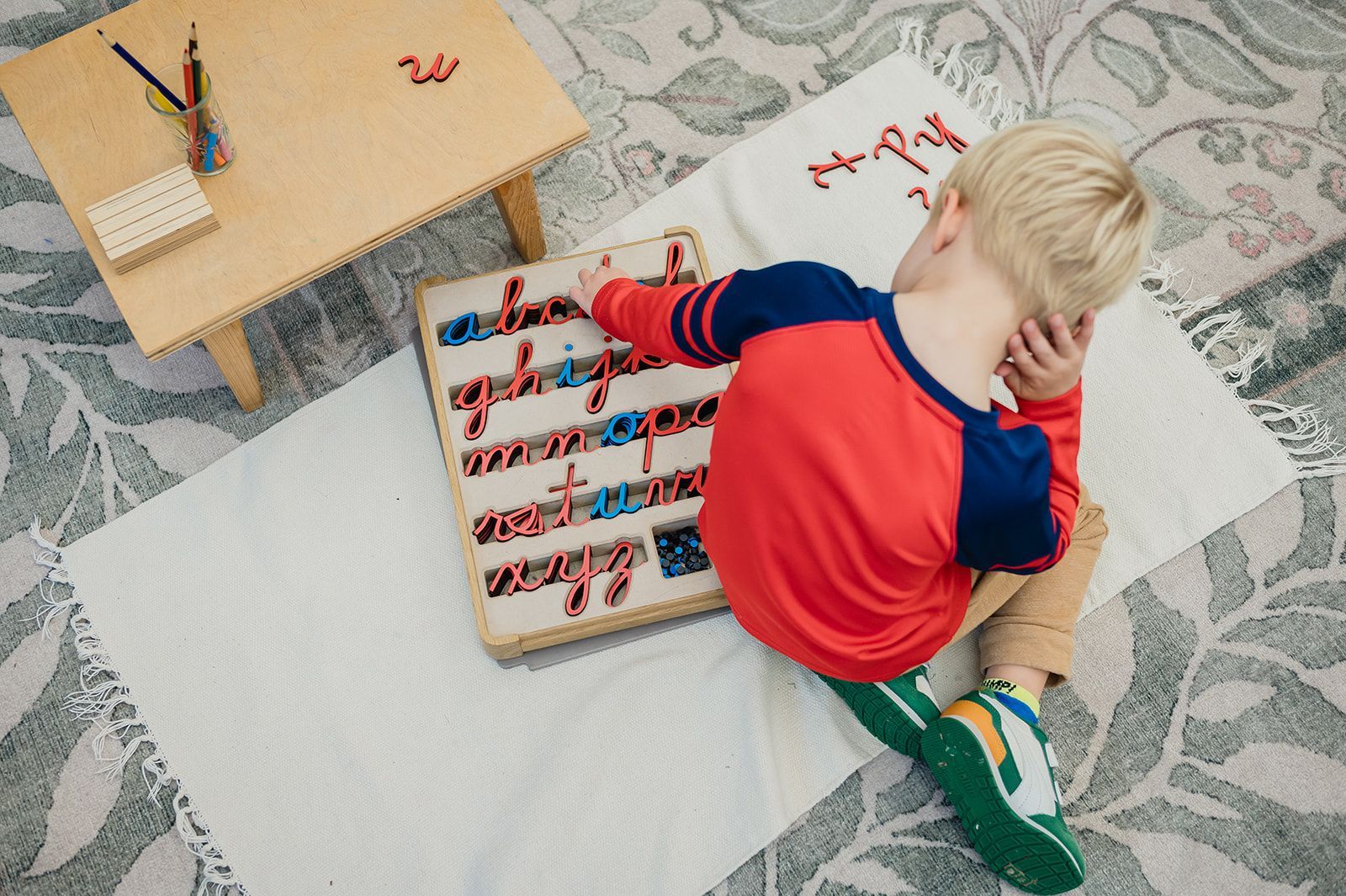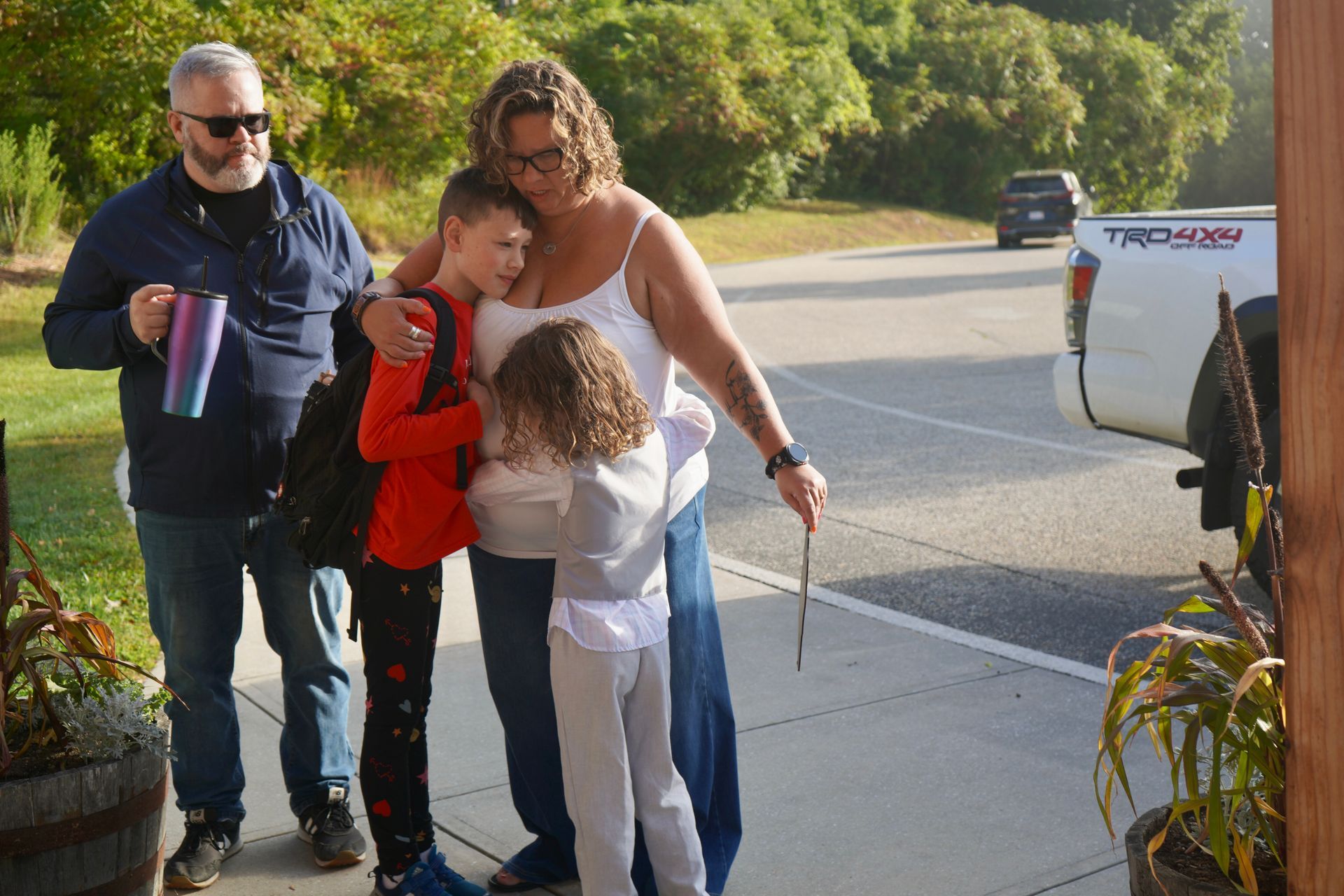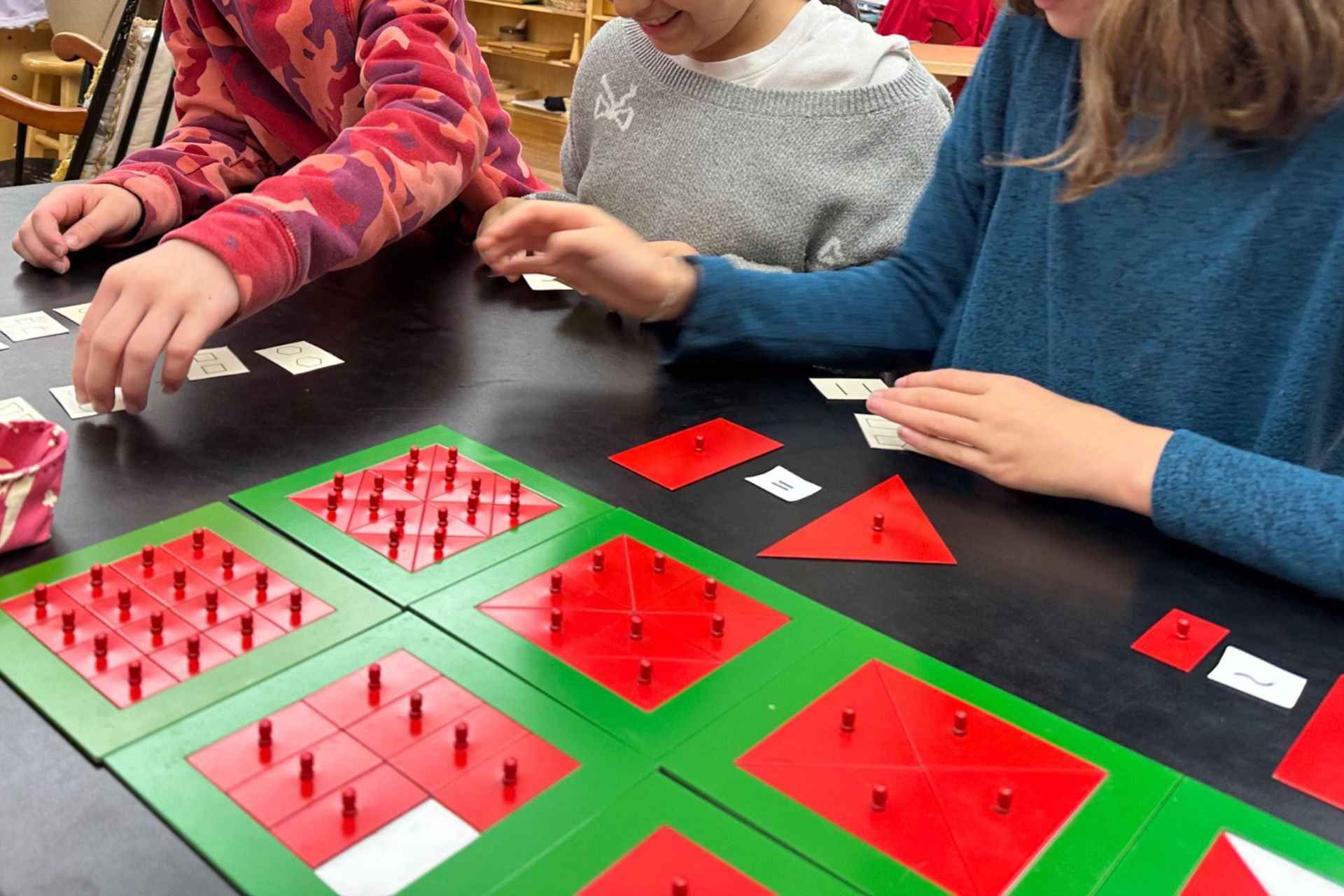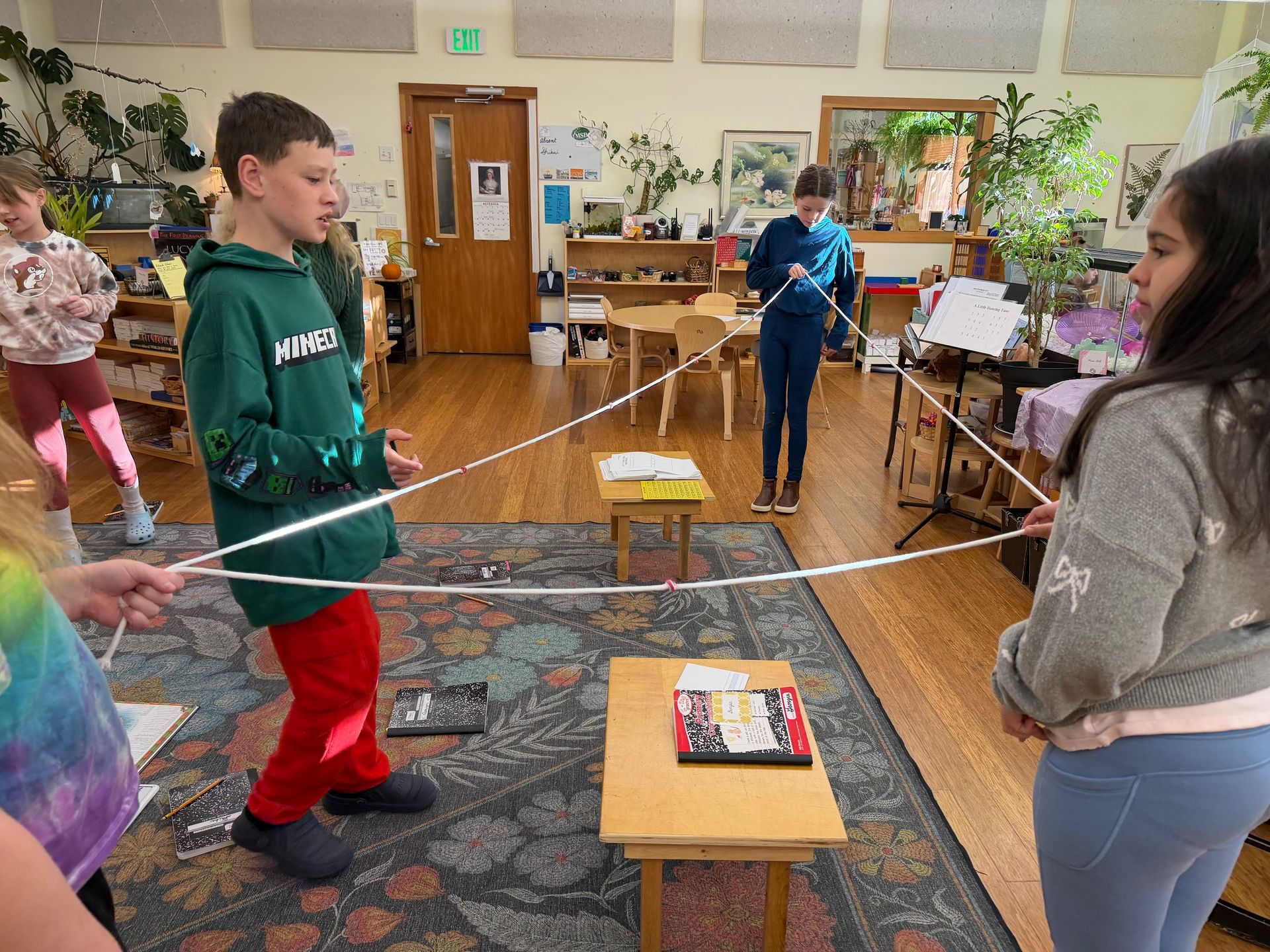Montessori Basics: What is ‘Practical Life’?
Meagan Ledendecker • April 21, 2020
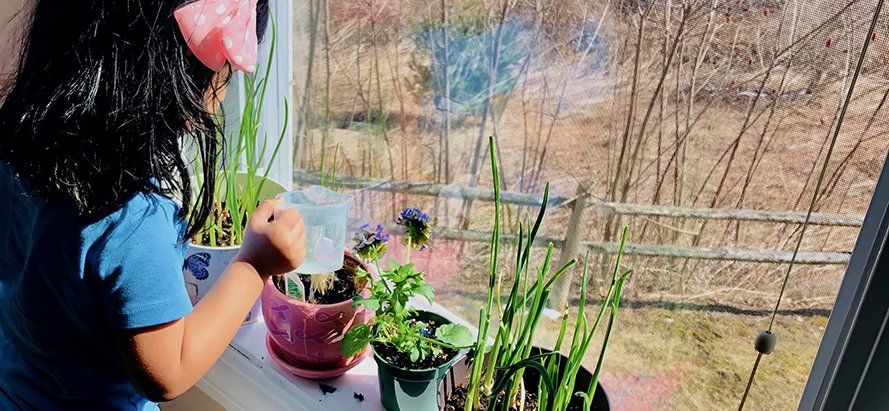
As Montessorians we believe education is more than just academics. We aim to nurture not only the intellect, but the development of the whole child in an effort to prepare them for all aspects of life.
Practical life in Montessori begins early and is intentionally woven into both toddler and primary classrooms, and beyond. The activities themselves are intended to give children practice so that they may work toward being independent in everyday living.
One wonderful aspect of practical life is how this important work can continue at home.
Care of the Environment
Children are not only capable of caring for their environment, they enjoy the process, especially when they are very young. In Montessori classrooms children are given lessons on how to clean up spills, care for pets and plants, wash dishes, fold napkins, and clean tables. Each of these lessons is given slowly and methodically, with the adult modeling the correct way to complete each activity. Children are given tools that are sized to work for them, and these tools are placed within reach of the child so that they may access them independently.
This work can easily be continued at home. Take the time to model household activities for your child, keeping in mind you will likely need to model the same activity multiple times. There are a variety of child-sized tools available for purchase, but those are not necessary to accomplish the goal. For example, if you would like to teach your child how to clean floors, this great set is available, or we can simply use a rag and a spray bottle. Small dustpan and brush sets are easy to find, too, and will be useful for years to come. Designate a small corner of your home to store these items. A small bin or basket is helpful, or perhaps low hooks on the wall.
By teaching children how to care for their environment, they gain confidence and independence in their ability to function as a contributing member of the family.
Control of Movement
In most Montessori Children’s House classrooms observers will find a line taped on the floor, placed as an opportunity for children to hone their gross motor skills. Children walk slowly and with purpose along the line, keeping their feet on the line and balancing as they go. Sometimes the addition of a bell can add challenge to the activity, with a child walking carefully so as not to allow the bell to ring as they move.
Similar activities can be done almost anywhere at home. Children naturally gravitate toward walking and balancing on logs, curbs, or anything else they come across. The challenge for many of us as adults can be to notice the importance of this activity in the moment, to slow down, and to allow for the child to immerse themselves in the experience. While it’s not always possible to stop and do this, your child will feel immense pride and accomplishment if they have the opportunity to slow down and just walk.
Montessori teachers also provide lots of fine motor experiences for children. In Montessori classrooms there are opportunities for pouring (rice, beans, water, etc.), transferring items from one container to another, and using a variety of implements to do so. Wondering how this might look at home? Try letting your child help out in the kitchen. There is no shortage of scooping, measuring, and using of tools that require concentration and fine motor development.
Care of the Person
One excellent marker of independence is how well we are able to care for ourselves. In Montessori schools, children are taught from an early age how to do simple things, such as put on and remove their shoes and coat by themselves. They are expected to do this daily and they take great pride in doing so. At home parents can start by allowing children to choose their own clothing (within weather-appropriate parameters) and to dress themselves. Clothing can be kept on low shelves and in low drawers so that the child may access items easily.
One fun element of this area of practical life is food preparation. Children are given lessons on how they might prepare a simple snack. This might include chopping of fruits and vegetables, spreading things like hummus or cream cheese, stirring ingredients together, or any other number of simple skills. All materials and food are left on a table for the children to access throughout the morning so that they may try the activity for themselves. Food preparation is a fun and natural activity to repeat in the home.
Grace and Courtesy
Grace and courtesy refers to how we might help children to be respectful and polite to others. Much of this work centers on adults modeling the correct vocabulary and movements associated with being polite and courteous in our society. We teach children to say “please”, “thank you”, “you’re welcome”, and “excuse me”. We encourage them to hold doors for each other, to offer food to one another, and to check in with anyone who is feeling hurt or upset.
Grace and courtesy is also about helping children develop empathy. We are social beings who need to live together peacefully if we are to accomplish anything. Montessori believed that children are the key to peace among humanity. This important work begins with simple practical life lessons, and continues throughout childhood and beyond.
If you want to learn more about practical life at home and in the Montessori environment, please let us know!

March 1 marks Baby Sleep Day, so we thought we’d take a moment to reflect on the alignment between Montessori philosophy and modern sleep science. In Montessori, we focus on independence as a path toward self-sufficiency. This is a gradual, mindful process of becoming capable. For our youngest children, this journey begins with mastery of the most fundamental human needs: eating, toileting, and sleeping. These areas matter deeply because they are ultimately under a child’s control. No one can make a child eat, use the toilet, or sleep. Our role, then, is not to force outcomes but to remove obstacles. As adults, we can provide thoughtful structure and support children as they develop the skills that build confidence and trust in their own bodies. Language Shapes Our Intentions In Montessori, our language reflects our values. For example, we don’t talk about “toilet training.” Instead, we focus on “toilet learning” because children are learning how to care for their bodies within the cultural norms. We are not training behavior. We are supporting development. The same is true for sleep. Rather than “sleep training,” Montessori invites us to think in terms of supporting independent sleep skills. We help children learn how to settle their bodies, self-soothe, and eventually fall asleep independently, all skills they will rely on for the rest of their lives. Why Sleep Matters So Much Research continues to affirm that sleep is foundational. Healthy sleep supports brain development and learning, emotional regulation, physical growth and immune function, and memory and attention. During sleep, children’s bodies perform essential functions, including muscle growth, tissue repair, protein synthesis, and the release of growth hormones. Deep sleep stages are when the most restorative processes occur. How Sleep Works Two systems guide sleep: circadian rhythm and sleep pressure. Circadian rhythm is the body’s internal 24-hour clock, regulated by light and darkness. When it’s dark, the brain releases melatonin (the sleep hormone). When it’s light, melatonin decreases, and cortisol helps us wake. This is why darkness supports sleep, blue light from screens disrupts it, and consistent bedtimes matter. Newborns are not born with a mature circadian rhythm. It begins developing around six weeks and becomes more established around three months, which explains why early baby sleep can feel unpredictable. The other factor is sleep pressure. The longer we’re awake, the stronger the drive to sleep. This pressure builds during the day and resets after a long stretch of rest. When children miss their sleep window and become overtired, stress hormones (adrenaline and cortisol) kick in, creating that familiar “second wind.” Suddenly, a child who desperately needs sleep seems wired and alert. Understanding sleep pressure helps us time sleep before children tip into exhaustion. A Montessori Framework for Healthy Sleep To support both healthy attachment and independence, Montessori encourages clear, loving boundaries. Sleep is no different. We can focus on four key factors: a prepared sleep environment, predictable and respectful routines, healthy sleep associations, and limits with flexibility. A Prepared Sleep Environment Just as we prepare our Montessori classrooms, we want to be intentional about preparing our child’s sleep space at home. Key components include ensuring that the space is: Dark (blackout curtains help melatonin production) Quiet and calm Free of stimulating toys Slightly cool A good question to ask ourselves is: Would I easily fall asleep here? Predictable, Respectful Routines Children feel secure when they know what comes next. A simple home routine might include: The final feeding Putting on pajamas Toileting/diapering Tooth brushing A short story or song A hug and kiss goodnight Long baths or extended reading are best before the sleep window, not during it. Healthy Sleep Associations Children form associations with the conditions present when they fall asleep. If a child falls asleep being rocked, fed, or held, they will often need that same support during natural night wakings. Instead, we want to place a child in bed drowsy but awake, so they can practice falling asleep independently. Comfort objects, such as a small blanket or stuffed animal, can support this process. Limits with Flexibility Sleep needs change as children grow. Consistency matters, but we don’t want to be unnecessarily rigid. It’s important to keep in mind, though, that older children may test boundaries, delay routines, or negotiate endlessly. Calm, consistent follow-through reassures children that the structure is dependable. And just as importantly, adults need support, too! Holding limits is much harder when we are sleep-deprived, so self-care is essential. Why Independent Sleep Is an Act of Care Babies naturally cycle through light and deep sleep many times each night. When they wake briefly between cycles, a child who knows how to self-settle can drift back to sleep without distress. Independent sleep skills: Reduce frequent night wakings Support early morning sleep Improve mood and learning Protect parents’ well-being Plus, poor sleep in infancy is linked to challenges later in childhood, including difficulties with emotional regulation and health concerns. Supporting sleep early is preventative care. A Closing Thought for Baby Sleep Day Supporting sleep is not about forcing independence. It’s about preparing the conditions so independence can emerge naturally, with confidence and trust. If you’re navigating sleep challenges, please know this: you don’t have to do it alone. Sleep is learned, supported, and refined over time (just like every other human skill!). We want to honor sleep not as a struggle to overcome, but as a vital rhythm to protect, for both our children and ourselves. If you are interested in learning more, schedule a visit here in Lenox today!
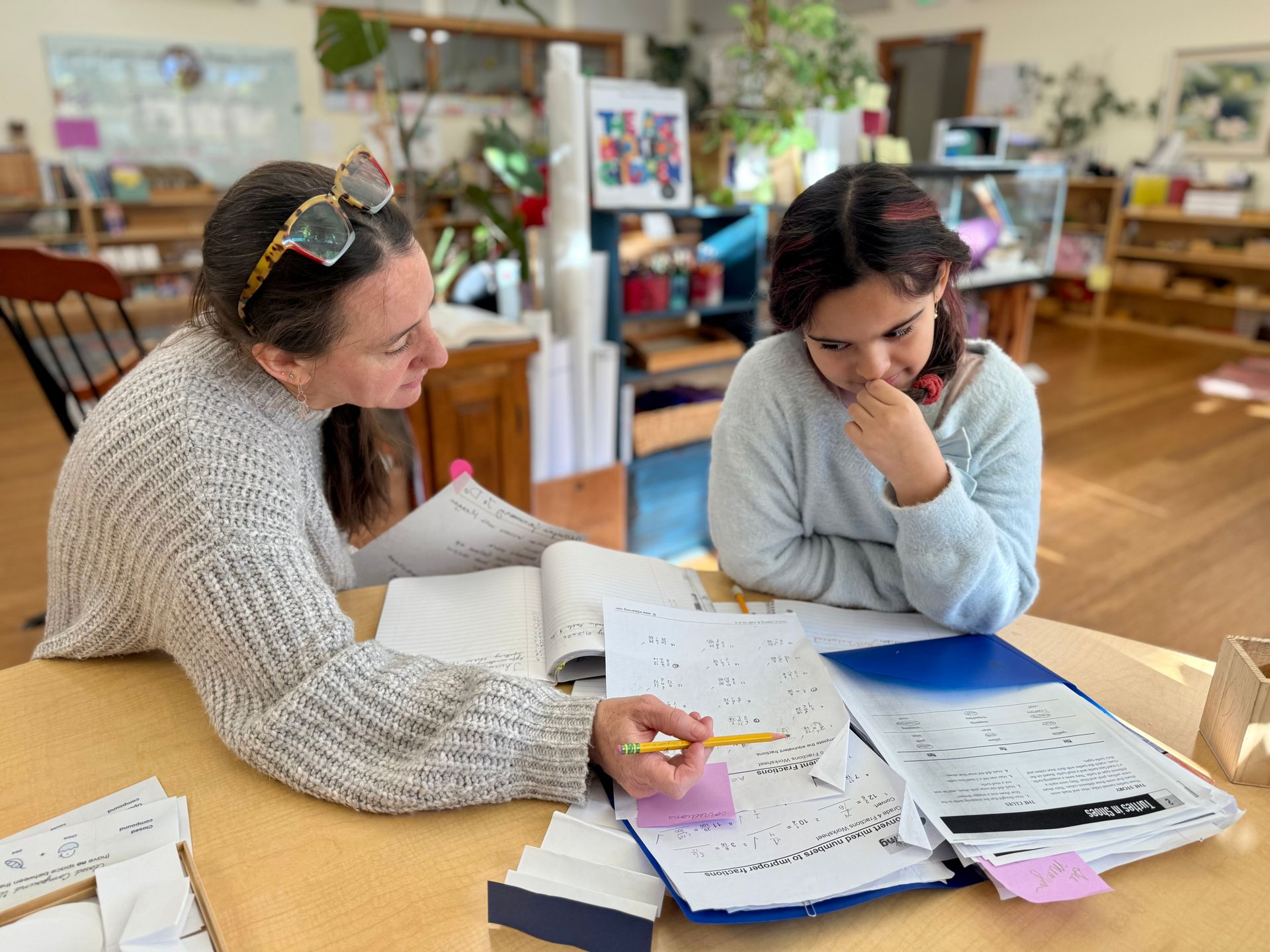
One of the quieter, less visible practices in a Montessori elementary classroom is the Child-Guide conference. You may never see it listed on a schedule or mentioned in a weekly update, yet it plays a profound role in children’s experience at school. Relationship Comes First The primary purpose of these conferences is to establish, maintain, and strengthen the relationship between the adult and each child. This focus shifts the dynamic from a teacher looking for faults or scolding about unfinished work. Rather, it’s a collegial conversation that enables children to take an active and engaged role in their own education. These connective conversations are grounded in relationship-building because when children feel emotionally safe and genuinely respected, they are far more willing to reflect, stretch themselves, and take responsibility for their growth. Every Child, as Often as They Need Montessori Guides aim to meet regularly with every child, but what “regularly” looks like can vary based on individual needs. Some children benefit from a longer, more formal conference every few weeks. Others need brief, frequent check-ins, sometimes lasting only a minute or two. These short moments might look like a quick conversation at the beginning of the morning, a gentle pause beside a table, or a quiet walk across the room together. The length of the meeting is not what matters. What is important is the message it sends: “I see you. I know your work. I care about how this is going for you.” What Happens in a Child-Guide Conference? While conferences vary based on each individual and the moment, they often include: The child bringing their learning journal or work (finished and unfinished) The guide bringing observational records A shared look at what has been accomplished Gentle reflection on what still feels unfinished Planning for what might come next Scheduling new lessons or presentations Support with larger projects: breaking them into steps, mapping timelines, imagining the finished product This collaborative time also provides an opportunity to experiment with new strategies (“Would you like to try creating a prioritized list?”), celebrate successes (“You worked so hard on your presentation! How did it feel to share your work?”), and reflect upon challenges (“It seems like you’ve been feeling a bit stuck in your research project. Tell me more about what is going on.”). Learning to Define “Finished” One of the most freeing lessons children learn in Montessori is that not every piece of work must be finished to an adult’s standard. Sometimes children accomplish exactly what they set out to do, and continuing would add nothing meaningful. Other times, interest has naturally ended, and letting go is healthy. This is not about lowering expectations. It is about honoring children’s internal sense of completion and learning when to release what no longer serves a purpose. Trusting Children’s Self-Assessment A cornerstone of these conferences is trust. Guides listen carefully to how children assess their own work and articulate their goals. When an adult truly accepts children’s self-assessment, something powerful happens: children begin to see themselves as capable, thoughtful, and worthy of being taken seriously. Children often receive more from the tone and sentiment of these meetings than from the actual content discussed. The Whole Child Matters Because Montessori education is concerned with the whole child, conferences may naturally move beyond academics. A Guide might gently offer support with social dynamics or ask about recent struggles during outdoor time. These moments provide a safe space for children to reflect on their own social, emotional, and physical development, and to recognize that there is a network of support. When Relationships Need Repair Even in the most thoughtful classrooms, relationships can become strained. What matters is how adults respond. It is never too late for a Guide to sit with a child and say, honestly: “I’ve been thinking about how we’ve been interacting recently, and I’d love to brainstorm with you about what I could do differently.” When an adult takes responsibility, without demanding the child do the same, something shifts. Trust begins to rebuild. Real dialogue becomes possible. Children learn from this modeling. In time, after they feel safe, they often step forward to take responsibility themselves. What Children Are Really Learning Through these quiet, intentional meetings, children learn that: their thoughts and feelings matter, adults can be trusted, mistakes are part of growth, reflection leads to independence, and relationships can be repaired. And while these conferences may happen quietly in a corner of the classroom, their impact echoes far beyond it. This is true preparation for life. To learn more about the long-term benefits of Montessori, visit us here in Lenox, MA!




